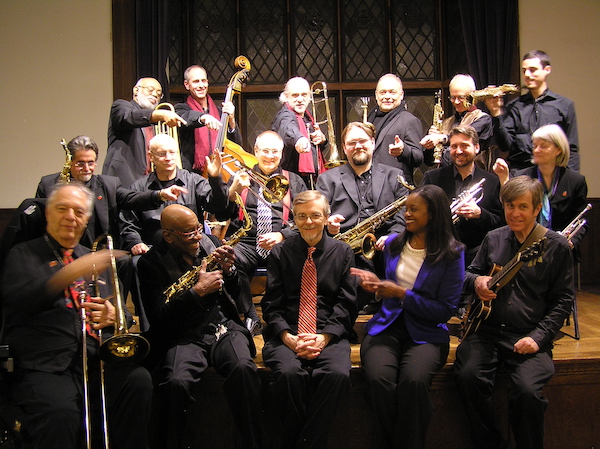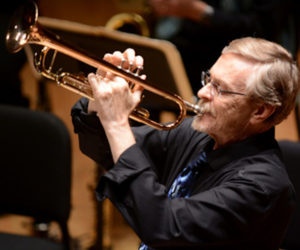Jazz Preview: Aardvark at 50 Sparks a Jazz Scene Sputtering Back to Life in Eastern Massachusetts
By Steve Elman
The pandemic clouds over the Boston / Cambridge jazz scene are breaking up – not completely by any means — but at last you have a broad menu of live music here to pull you away from your TV bingeing.

Mark Harvey’s Aardvark Jazz Orchestra in 2016. Photo: courtesy of the artists
The Celebrity Series of Boston’s 2022/2023 season spotlights more jazz than ever before, beginning with a much-anticipated show by the Maria Schneider Orchestra at Sanders Theater on October 7. Scullers is back, programming music on Friday and Saturday nights and bringing some noteworthy headliners back to town at last; two nights isn’t enough, but it’s a promising start. The Mad Monkfish is up and running with a vengeance in Central Square, consistently putting some of our best local players on stage in their Jazz Baroness Room. The avant-garde continues to have a voice at the heroic little Lilypad in Inman Square. City Winery occasionally dips its toe into the jazz waters, and has a regular jazz brunch on Sundays featuring Berklee players. However, the Regattabar’s calendar still has the grim legend “Temporarily Closed” darkening October, November, and December, as it has for more than two and a half years.
Fortunately, the Plague Years did not silence the area’s notable jazz composers.
Darrell Katz brought out a heartfelt tribute to his late wife, poet Paula Tatarunis, in his CD Galeanthropology (JCA, 2021), which he will perform live with his group Oddsong on November 7 at Berklee. Plus, the Jazz Composers’ Alliance Orchestra, a composers-collective ensemble he co-leads, also plays live at Berklee this fall, with a collection of new music by Bob Pilkington, Dave Harris, Mimi Rabson, and Katz himself, on October 20.
Russ Gershon, the founder of the Either/Orchestra, continues to explore, leading no fewer than three different concept ensembles this fall, including a very intriguing re-creation of Miles Davis’s electric music at the Lilypad on October 1. He says, “This Miles project has been a revelation … it’s music that defies transcription and can only be ‘properly’ played on the level of fundamental principles, which these players [in his group Listen to This] absorbed almost fifty years ago.” Gershon also has two Either/Orchestra albums in the can (one of which continues the group’s interpretations of music from Ethiopia), and he hopes to bring them to market and get the little-big band performing again next year. (For more on the group, see my 2010 post.)
Here‘s a chronology of notable jazz events in the coming months.
And Mark Harvey’s Aardvark Jazz Orchestra begins its 50th season this fall. I last spotlighted Harvey and this extraordinary ensemble 10 years ago in the Fuse, and I’m glad to say that the comments I made then still hold true.
Their upcoming show, kicking off season 50 at MIT’s Kresge Auditorium on October 1, looks to be another great outing, and once again an opportunity to hear Harvey’s inspired compositions for a collection of exceptional players, most of whom have been part of Aardvark for decades. Like Duke Ellington, Harvey wants voices of originality in this ensemble, and he writes with them in mind — Arni Cheatham, Bill Lowe, Phil Scarff, Dan Lupan, Bob Pilkington, Allan Chase. Each of these voices is unmistakably individual, and when one of them speaks, you’re compelled to listen.
The concert kicking off Season 50 will be typical and atypical, topical and timeless, with all of those redoubtable contributors back on stage again, along with singers, including Grace Hughes, who has been with the orchestra since at least 2014.
It will have a new Harvey composition called “America Agonistes,” another in his series of commentaries on the society we live in and what we should do to make it better. About this new work, Harvey says, “I wrote this over the summer [of 2022] with mass shootings, racial upheaval, the Covid death toll passing one million…. I needed a way to channel my sorrow and outrage and figured others may well be needing a similar vehicle to express their own feelings or in which they could find resonance.”

Mark Harvey in action. Photo: courtesy of the artist
It will also have three pieces by one of Harvey’s godfathers and household gods, Ellington: a revival of the rarely performed “It’s Freedom,” one of the numbers originally from Duke’s Second Sacred Concert, reworked by Harvey as an instrumental showcase; “Tell Me It’s the Truth,” from the First Sacred Concert; and the perennially moving “Come Sunday.”
In addition to “America Agonistes,” there will be four other Harvey originals, including the powerful title composition from Aardvark’s last CD release, Faces of Souls (Leo, 2020). This latter work was inspired by two intertwined sources — the recently restored bronze sculpture Robert Gould Shaw and the 54th Regiment Memorial, commemorating the first all-Black company of soldiers in the Civil War, which was created by sculptor Augustus Saint-Gaudens and unveiled on Boston Common in 1897; and the music of composer Charles Ives, who referred to the monument in the prose-poem that accompanies the score to Three Places in New England (1903-29): “moving marching, faces of souls, part-freers of destiny.” Harvey’s “Faces of Souls” is noteworthy for its structure: between written parts of the work, he calls for 16 players from Aardvark, set into four quartets, to collectively improvise and move the piece from one emotion to another.
The upcoming show also marks Harvey’s retirement from the faculty at MIT — and possibly the last of Aardvark’s shows at Kresge. Harvey says his new status will not mean pipe and slippers before the fire. He hopes to “keep composing, keep the band moving forward, perhaps do some research and writing, and have time to read books for pleasure rather than for academic deadlines. And [have] some more time for relaxation.”
For all these remarkable composers and players, the beat is going on again … at long last, and it’s about time.
Steve Elman’s more than four decades in New England public radio have included ten years as a jazz host in the 1970s, five years as a classical host on WBUR in the 1980s, a short stint as senior producer of an arts magazine, 13 years as assistant general manager of WBUR, and fill-in classical host on 99.5 WCRB.

